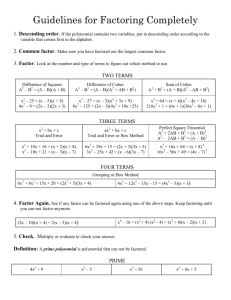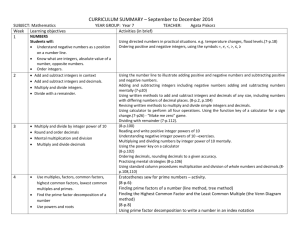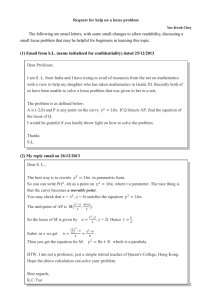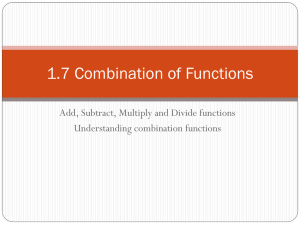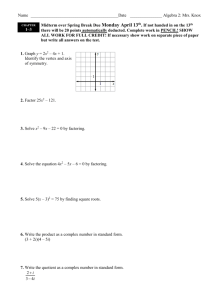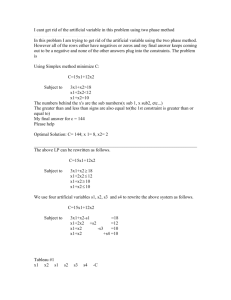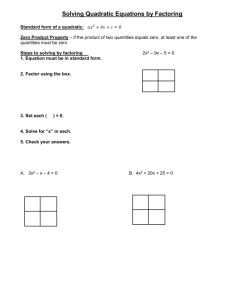A Clever Method for Factoring Trinomials – Solutions
advertisement
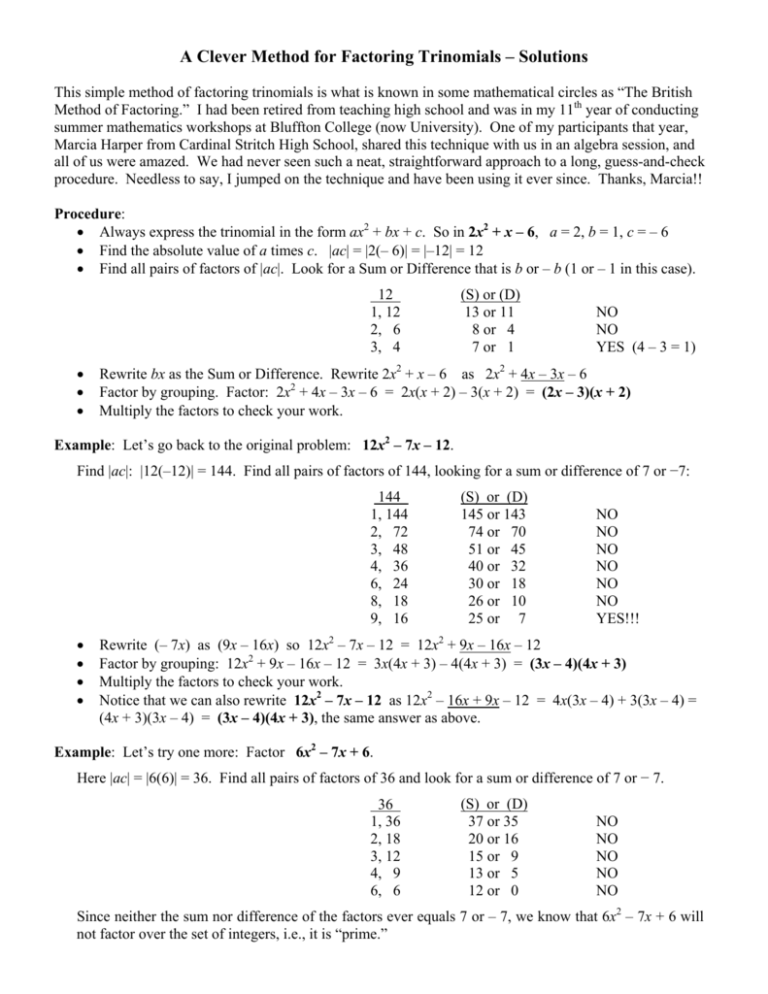
A Clever Method for Factoring Trinomials – Solutions This simple method of factoring trinomials is what is known in some mathematical circles as “The British Method of Factoring.” I had been retired from teaching high school and was in my 11th year of conducting summer mathematics workshops at Bluffton College (now University). One of my participants that year, Marcia Harper from Cardinal Stritch High School, shared this technique with us in an algebra session, and all of us were amazed. We had never seen such a neat, straightforward approach to a long, guess-and-check procedure. Needless to say, I jumped on the technique and have been using it ever since. Thanks, Marcia!! Procedure: • Always express the trinomial in the form ax2 + bx + c. So in 2x2 + x – 6, a = 2, b = 1, c = – 6 • Find the absolute value of a times c. |ac| = |2(– 6)| = |–12| = 12 • Find all pairs of factors of |ac|. Look for a Sum or Difference that is b or – b (1 or – 1 in this case). 12 1, 12 2, 6 3, 4 • • • (S) or (D) 13 or 11 8 or 4 7 or 1 NO NO YES (4 – 3 = 1) Rewrite bx as the Sum or Difference. Rewrite 2x2 + x – 6 as 2x2 + 4x – 3x – 6 Factor by grouping. Factor: 2x2 + 4x – 3x – 6 = 2x(x + 2) – 3(x + 2) = (2x – 3)(x + 2) Multiply the factors to check your work. Example: Let’s go back to the original problem: 12x2 – 7x – 12. Find |ac|: |12(–12)| = 144. Find all pairs of factors of 144, looking for a sum or difference of 7 or −7: 144 1, 144 2, 72 3, 48 4, 36 6, 24 8, 18 9, 16 • • • • (S) or (D) 145 or 143 74 or 70 51 or 45 40 or 32 30 or 18 26 or 10 25 or 7 NO NO NO NO NO NO YES!!! Rewrite (– 7x) as (9x – 16x) so 12x2 – 7x – 12 = 12x2 + 9x – 16x – 12 Factor by grouping: 12x2 + 9x – 16x – 12 = 3x(4x + 3) – 4(4x + 3) = (3x – 4)(4x + 3) Multiply the factors to check your work. Notice that we can also rewrite 12x2 – 7x – 12 as 12x2 – 16x + 9x – 12 = 4x(3x – 4) + 3(3x – 4) = (4x + 3)(3x – 4) = (3x – 4)(4x + 3), the same answer as above. Example: Let’s try one more: Factor 6x2 – 7x + 6. Here |ac| = |6(6)| = 36. Find all pairs of factors of 36 and look for a sum or difference of 7 or − 7. 36 1, 36 2, 18 3, 12 4, 9 6, 6 (S) or (D) 37 or 35 20 or 16 15 or 9 13 or 5 12 or 0 NO NO NO NO NO Since neither the sum nor difference of the factors ever equals 7 or – 7, we know that 6x2 – 7x + 6 will not factor over the set of integers, i.e., it is “prime.” Practice: Factor completely. (See answers below) 1. 2. 3. 4. 5. 6. 7. 8. 6m2 + 13m + 6 6m2 – 5m – 6 24c2 – 34c – 45 12c2 + 64c + 45 4x2 + 16x – 84 4x2 – 41x – 82 36x2 – 120x + 100 36x2 – 225x – 100 Answers: 1. 6m2 + 13m + 6. Here is a trinomial whose leading coefficient is not 1. Note that |ac| = |6 × 6| = 36. Find pairs of factors of 36 until their sum or difference is 13: 36 1, 36 2, 18 3, 12 4, 9 Let 13m = 4m + 9m, so 6m2 + 13m + 6 = = = = (S) or (D) 37 or 35 20 or 16 15 or 9 13 or 5 NO NO NO YES!! 6m2 + 4m + 9m + 6 (6m2 + 4m) + (9m + 6) 2m(3m + 2) + 3(3m + 2) (2m + 3)(3m + 2) 2. 6m2 – 5m – 6. Note in # 1, we found that the factors 4 and 9 gave us a difference of 5. This time let the middle term – 5m = 4m – 9m so 6m2 – 5m – 6 = = = = 3. 6m2 + 4m – 9m – 6 (6m2 + 4m) – (9m + 6) 2m(3m + 2) – 3(3m + 2) (2m – 3)(3m + 2) 24c2 – 34c – 45. Note that |24(-45)| = |–1080| = 1080 1080 1, 1080 2, 540 3, 360 4, 270 5, 216 6, 180 8, 135 9, 120 10, 108 12, 90 15, 72 18, 60 20, 54 (S) or (D) 1081 or 1079 542 or 538 363 or 357 274 or 266 221 or 211 186 or 174 143 or 127 129 or 111 118 or 98 102 or 78 87 or 57 78 or 42 74 or 34 So 24c2 – 34c – 45 = 24c2 + 20c – 54c – 45 = 4c(6c + 5) – 9(6c + 5) = (4c – 9)(6c + 5) NO NO NO NO NO NO NO NO NO NO NO NO FINALLY!! 4. 12c2 + 64c + 45. Note that |12 × 45| = 540. List all pairs of factors of 540 until we find a sum or difference of 64. In this case we spot right away that 54 and 10 will work. Thus, 12c2 + 64c + 45 = 12c2 + 54c + 10c + 45 = 6c(2c + 9) + 5(2c + 9) = (6c + 5)(2c + 9) 5. 4x2 + 16x – 84. Note that in this case we can take out a common factor of 4, leaving: 4(x2 + 4x – 21) = 4(x + 7)(x – 3) 6. 4x2 – 41x – 82. Note that |4(−82)| = 328. List all pairs of factors of 328 until we find a sum or difference of 41. 328 (S) or (D) 1, 328 329 or 327 NO 2, 164 166 or 162 NO 4, 82 86 or 78 NO 8, 41 49 or 33 NO Since √328 < 19, we have found and tried all possible pairs of factors of 328. Since none of their sums or differences is equal to 41, we know 4x2 – 41x – 82 is not factorable. It is prime. Note: We can also use the discriminant (b2 – 4ac) to determine whether a trinomial is factorable over the set of rational numbers. In this case, b2 – 4ac = (–41)2 – 4(4)(–82) = 2993. Because 2993 is not a perfect square, 4x2 – 41x – 82 is prime, or not factorable. 7. 36x2 – 120x + 100. Note that there is a common factor of 4: 36x2 – 120x + 100 = 4(9x2 – 30x + 25) = 4(3x – 5)(3x – 5) 8. 36x2 – 225x – 100. Note that |36(−100)| = 3600. List all pairs of factors of 3600 until we find a sum or difference of 225. 3600 1, 3600 2, 1800 3, 1200 4, 900 5, 720 6, 600 8, 450 9, 400 10, 360 12, 300 15, 240 Thus we can write: (S) or (D) 3601 or 3599 1802 or 1798 1203 or 1197 904 or 896 725 or 715 606 or 594 458 or 442 409 or 391 370 or 350 312 or 288 255 or 225 36x2 – 225x – 100 = 36x2 + 15x − 240x – 100 = 3x(12x + 5) − 20(12x + 5) = (3x − 20)(12x + 5) NO NO NO NO NO NO NO NO NO NO YES!!!
